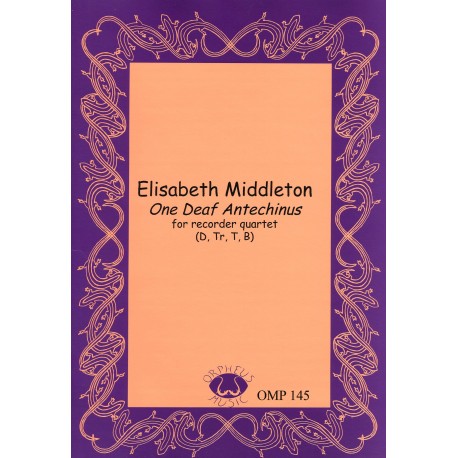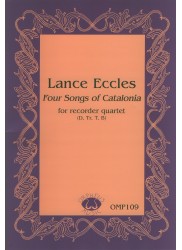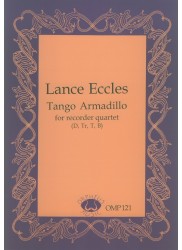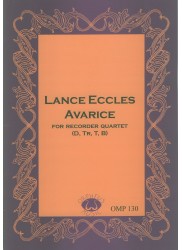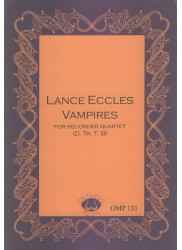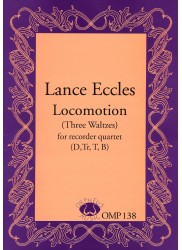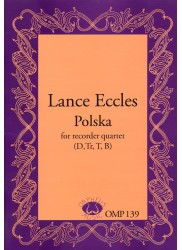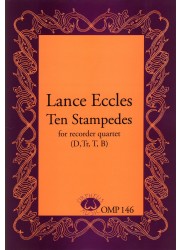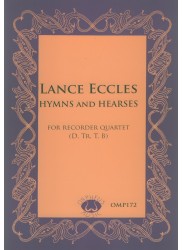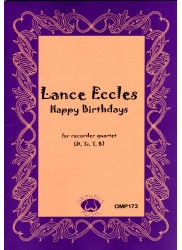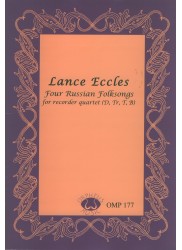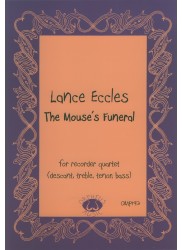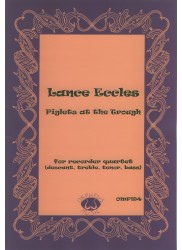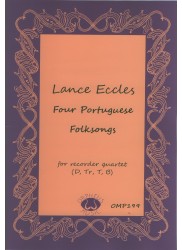No products
Prices are tax included
One Deaf Antechinus
Composer: Middleton - Elisabeth
Instrumentation: Descant - Treble - Tenor - Bass
Period/Genre: Australian Contemporary
Grade: Easy - Moderate
More info
*Contemporary Piece.* Three Blind Mice will never be the same after this jazzy and fun romp around its artfully concealed musical material.
Composer Elizabeth Middleton is from Taree, New South Wales, Australia, Elizabeth Middleton studied at the Sydney Conservatorium and at Sydney Teacher's College. She has taught music in high schools, keyboard for Yamaha and recorder for community music classes and in an alternative primary school. She has been a member of the Victorian Recorder Guild for some years and has played recorder in various groups.
_Score 5 pp. Parts 1 pp
Elizabeth Middleton, One Deaf Antechinus OMP145
This pieces looks quite fun, especially for a group of children with some facility. The harmonic language is simple, the swung quavers fun and brief interlude from C major into A major should keep them on their toes. All four parts (SATB) have some interest even the bass player gets to zip up and down some swung quavers. At only one page long this piece would prove a good concert piece with wnough in it to get to grips wit it. Now if only I knew how to play "marsupially"....
Jean McCreery, The Recorder Magazine, XX-XX.
Elizabeth Middleton, One Deaf Antechinus OMP145
From Taree, New South Wales, Australia, Elizabeth Middleton studied at the Sydney Conservatorium and at Sydney Teacher's College. She has taught music in high schools, keyboard for Yamaha and recorder for community music classes and in an alternative primary school. She has been a member of the Victorian Recorder Guild for some years and has played recorder in various groups.
Her One Deaf Antechinus is a clever take-off in the "three blind mice". Instead of three blind mice, though, we have one deaf marsupial introduced "marsupially" with a series of half notes in A minor. This is followed by a jazzy series of eigths where Middleton asks fir "swing quavers". these are tossed back and forth among the four instrument. It continues with a key change and a short waltz, followed by the return to 2/2 and later in the original key.
This would be a fun and somewhat challenging piece for a high intermediate consort. The group must have a good feel for Jazz rhythms, and the soprano is asked to flutter tongue on a high G# near the end. Our consort plans to include this work into our repertoire.
Bill Rees, American Recorder, XX-XX.
30 other products in the same category:
Reference: OMP109
Brand: Orpheus Music
Four Songs of Catalonia
Composer: Eccles - Lance Instrumentation: Descant - Treble - Tenor - Bass...
In StockReference: OMP109.pdf
Brand: Orpheus Music
Four Songs of Catalonia
PLEASE NOTE - DOWNLOADABLE PDF VERSION Composer: Eccles - Lance...
$22.00 -20%In StockReference: OMP118
Brand: Orpheus Music
The East is Red and Liuyang River
Composer: Eccles - LanceInstrumentation: Descant - Treble - Tenor -...
In StockReference: OMP118.pdf
Brand: Orpheus Music
The East is Red and Liuyang River
PLEASE NOTE - DOWNLOADABLE PDF VERSION Composer: Eccles -...
$17.50 -20%In StockReference: OMP121
Brand: Orpheus Music
Tango Armadillo
Composer: Eccles - LanceInstrumentation: Descant - Treble - Tenor -...
In StockReference: OMP121.pdf
Brand: Orpheus Music
Tango Armadillo
PLEASE NOTE - DOWNLOADABLE PDF VERSION Composer: Eccles -...
$16.00 -20%In StockReference: OMP129
Brand: Orpheus Music
Ruins
Composer: Eccles - LanceInstrumentation: Descant - Treble - Tenor -...
In StockReference: OMP129.pdf
Brand: Orpheus Music
Ruins
PLEASE NOTE - DOWNLOADABLE PDF VERSION Composer: Eccles -...
$22.00 -20%In StockReference: OMP130
Brand: Orpheus Music
Avarice
Composer: Eccles - LanceInstrumentation: Descant - Treble - Tenor -...
In StockReference: OMP130.pdf
Brand: Orpheus Music
Avarice
PLEASE NOTE - DOWNLOADABLE PDF VERSION Composer: Eccles -...
$20.50 -20%In StockReference: OMP131
Brand: Orpheus Music
Vampires
Composer: Eccles - LanceInstrumentation: Descant - Treble - Tenor -...
In StockReference: OMP131.pdf
Brand: Orpheus Music
Vampires
PLEASE NOTE - DOWNLOADABLE PDF VERSION Composer: Eccles -...
$20.50 -20%In StockReference: OMP138
Brand: Orpheus Music
Locomotion
Composer: Eccles - LanceInstrumentation: Descant - Treble - Tenor -...
In StockReference: OMP138.pdf
Brand: Orpheus Music
Locomotion
PLEASE NOTE - DOWNLOADABLE PDF VERSION Composer: Eccles -...
$20.50 -20%In StockReference: OMP139
Brand: Orpheus Music
Polska
Composer: Eccles - LanceInstrumentation: Descant - Treble - Tenor -...
In StockReference: OMP139.pdf
Brand: Orpheus Music
Polska
PLEASE NOTE - DOWNLOADABLE PDF VERSION Composer: Eccles -...
$20.50 -20%In StockReference: OMP140
Brand: Orpheus Music
Four Revolutionary Songs from North West China
Composer: Eccles - LanceInstrumentation: Descant - Treble - Tenor -...
In StockReference: OMP146
Brand: Orpheus Music
Ten Stampedes
Composer: Eccles - LanceInstrumentation: Descant - Treble - Tenor -...
In StockReference: OMP146.pdf
Brand: Orpheus Music
Ten Stampedes
PLEASE NOTE - DOWNLOADABLE PDF VERSION Composer: Eccles -...
$36.00 -20%In StockReference: OMP172
Brand: Orpheus Music
Hymns and Hearses
Composer: Eccles - LanceInstrumentation: Descant - Treble - Tenor -...
In StockReference: OMP172.pdf
Brand: Orpheus Music
Hymns and Hearses
PLEASE NOTE - DOWNLOADABLE PDF VERSION Composer: Eccles -...
$28.00 -20%In StockReference: OMP173
Brand: Orpheus Music
Happy Birthdays
Composer: Eccles - LanceInstrumentation: Descant - Treble - Tenor -...
In StockReference: OMP173.pdf
Brand: Orpheus Music
Happy Birthdays
PLEASE NOTE - DOWNLOADABLE PDF VERSION Composer: Eccles -...
$20.50 -20%In StockReference: OMP177
Brand: Orpheus Music
Four Russian Folksongs
Composer: Eccles - LanceInstrumentation: Descant - Treble - Tenor -...
In StockReference: OMP177.pdf
Brand: Orpheus Music
Four Russian Folksongs
PLEASE NOTE - DOWNLOADABLE PDF VERSION Composer: Eccles - Lance...
$20.50 -20%In StockReference: OMP193
Brand: Orpheus Music
The Mouse's Funeral
Composer: Eccles - LanceInstrumentation: Descant - Treble - Tenor -...
In StockReference: OMP193.pdf
Brand: Orpheus Music
The Mouse's Funeral
PLEASE NOTE - DOWNLOADABLE PDF VERSION Composer: Eccles -...
$20.50 -20%In StockReference: OMP194
Brand: Orpheus Music
Piglets at the Trough
Composer: Eccles - LanceInstrumentation: Descant - Treble - Tenor -...
In StockReference: OMP194.pdf
Brand: Orpheus Music
Piglets at the Trough
PLEASE NOTE - DOWNLOADABLE PDF VERSION Composer: Eccles -...
$20.50 -20%In StockReference: OMP199
Brand: Orpheus Music
Four Portuguese Folksongs
Composer: Eccles - LanceArranger: Lance EcclesInstrumentation: Descant -...
In Stock

